Boiler Installation Withnell
Find top New Boiler in Withnell
Get 3 FREE New Boiler quotes for your project today! Compare profiles, reviews, accreditations, portfolio, etc... and choose the best deal.
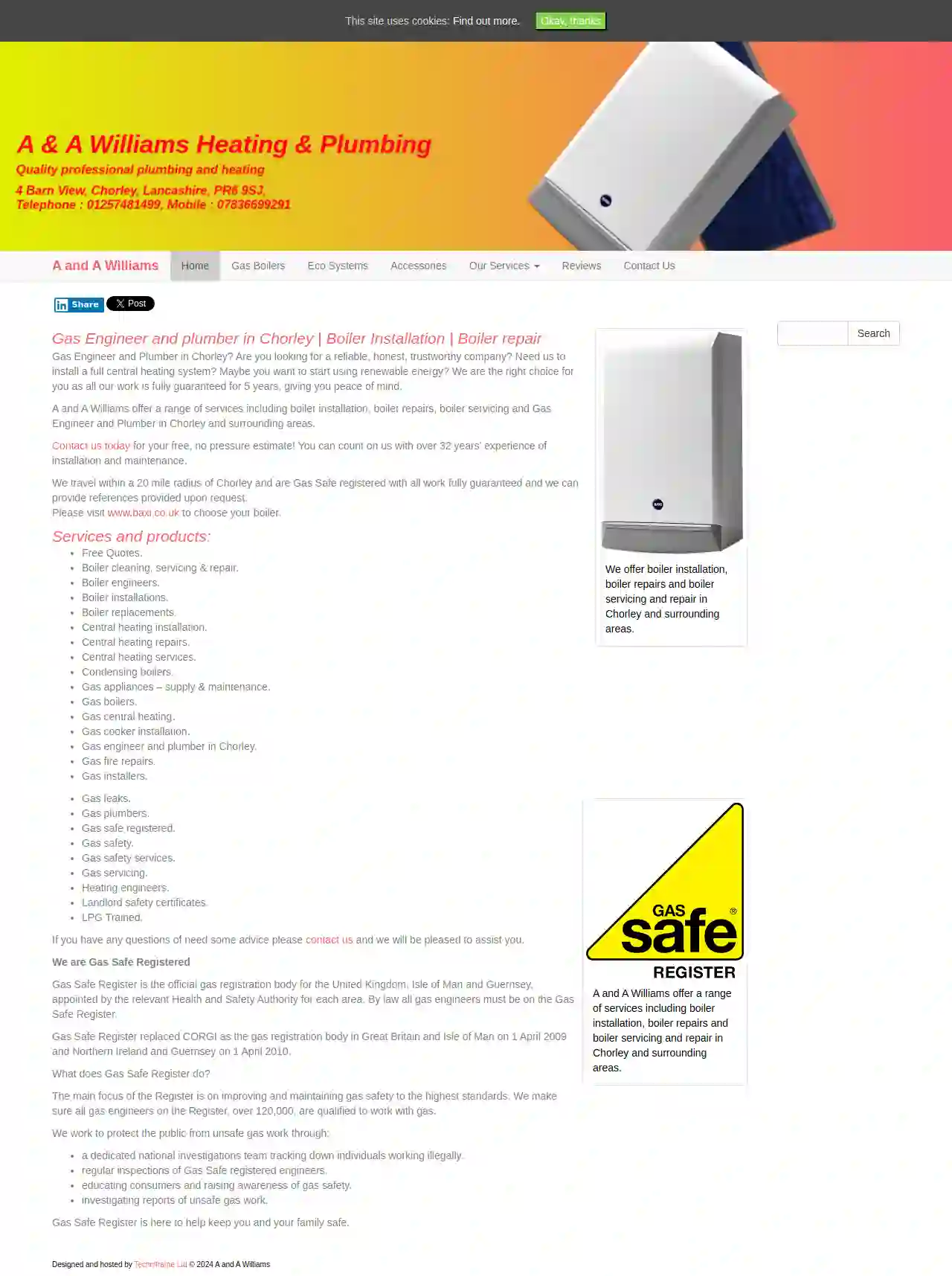
A & A Williams Heating & Plumbing
57 reviewsChorley, GBA and A Williams is a quality professional plumbing and heating service based in Chorley. We offer a range of services including boiler installation, boiler repairs, boiler servicing and repair in Chorley and surrounding areas. With over 32 years’ experience, we are Gas Safe registered and all our work is fully guaranteed for 5 years, giving you peace of mind. We travel within a 20 mile radius of Chorley and can provide references upon request. Please visit www.baxi.co.uk to choose your boiler. Our team of experienced engineers are dedicated to providing a reliable, honest and trustworthy service. Whether you need a full central heating system installed, or simply want to start using renewable energy, we are the right choice for you. Contact us today for your free, no pressure estimate! We are Gas Safe Registered. Gas Safe Register is the official gas registration body for the United Kingdom, Isle of Man and Guernsey, appointed by the relevant Health and Safety Authority for each area. By law all gas engineers must be on the Gas Safe Register. Gas Safe Register replaced CORGI as the gas registration body in Great Britain and Isle of Man on 1 April 2009 and Northern Ireland and Guernsey on 1 April 2010. The main focus of the Register is on improving and maintaining gas safety to the highest standards. We make sure all gas engineers on the Register, over 120,000, are qualified to work with gas. We work to protect the public from unsafe gas work through; a dedicated national investigations team tracking down individuals working illegally, regular inspections of Gas Safe registered engineers, educating consumers and raising awareness of gas safety, investigating reports of unsafe gas work. Gas Safe Register is here to help keep you and your family safe.
- Services
- Why Us?
- Accreditations
- Gallery
Get Quote
D M H Lanc Ltd
51 reviews47 School Lane, Newton, PR4 3RT, GBTrading as DMH (Lancs) Ltd WELCOME TO DREW MYERSCOUGH HEATING. PROFESSIONAL, WORCESTER BOSCH ACCREDITED HEATING ENGINEER CENTRAL HEATING AND BOILER SERVICES THROUGHOUT THE PRESTON AREAS AND THE FYLDE BY DREW MYERSCOUGH HEATING ENGINEER Hello – I’m Drew. I’m a Worcester Bosch accredited and highly experienced, time served (since 1989) central heating and boiler engineer. I’m able to repair, service and install all makes of boiler. With Worcester accreditation I can provide a 10 or 12 year guarantee on Worcester Bosch boilers and controls! I work hard to ensure that all repairs and installations are carried out in a tidy, methodical and safe manner and I treat every central heating repair or boiler installation as a valuable addition to my portfolio of work that I have carried out in Preston and throughout the Fylde Coast. I have built up many references, testimonials and photographs of my heating work over the years. PROFESIONAL Always aiming to offer the very highest of standards throughout all of the work I carry out, which is reflected in my long established and happy customer base. WORCESTER BOSCH ACCREDITED I’m a Worcester Bosch accredited and highly experienced central heating and boiler engineer. TRANSPARENT BILLING Offering a no call out charge service, you will always know exactly what you are paying for and the service you will expect to recieve
- Services
- Why Us?
- Accreditations
- Our Team
- Gallery
Get Quote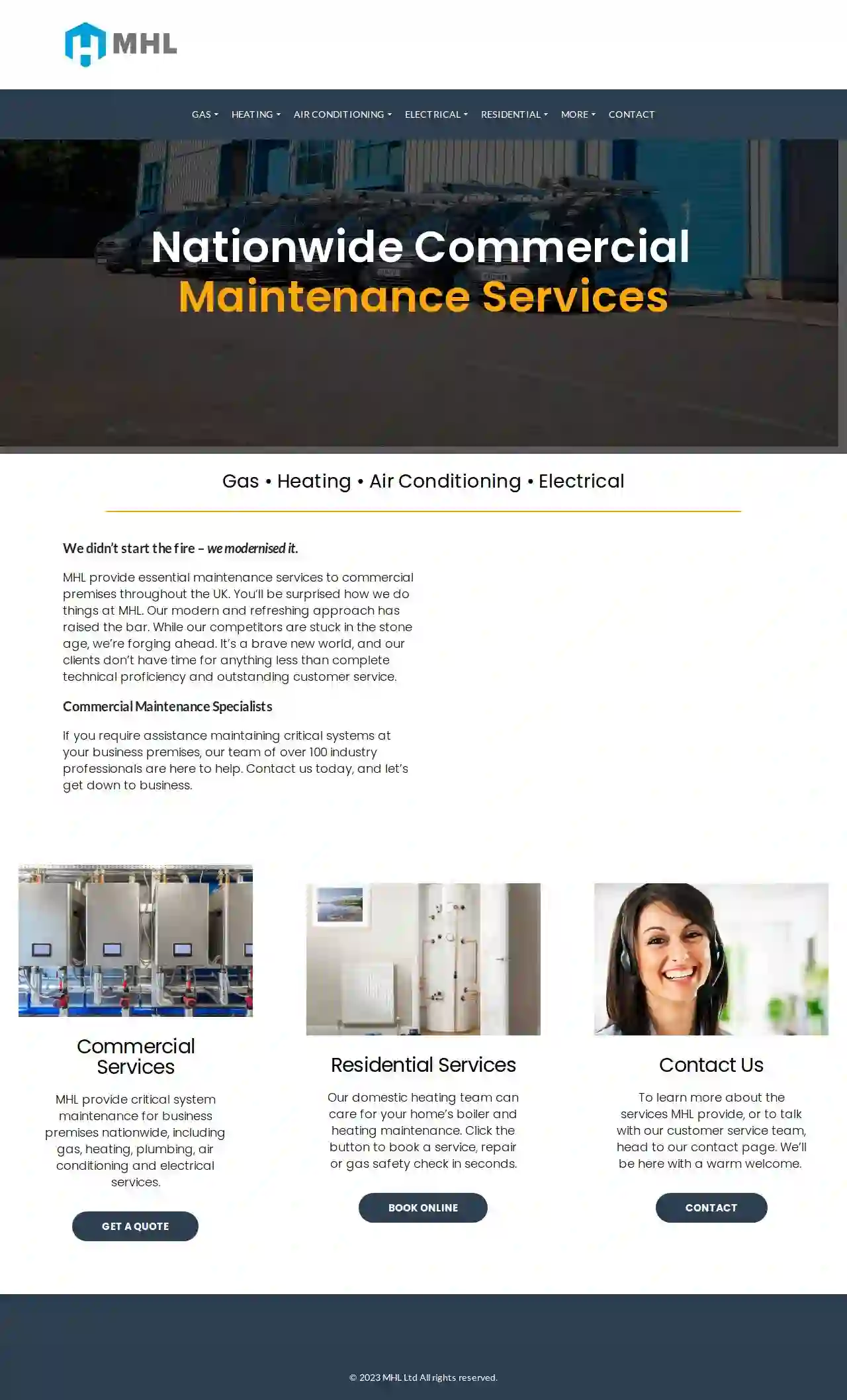
MHL Ltd
4.9106 reviewsChorley, GBMHL provide essential maintenance services to commercial premises throughout the UK. You'll be surprised how we do things at MHL. Our modern and refreshing approach has raised the bar. While our competitors are stuck in the stone age, we're forging ahead. It's a brave new world, and our clients don't have time for anything less than complete technical proficiency and outstanding customer service. Commercial Maintenance SpecialistsIf you require assistance maintaining critical systems at your business premises, our team of over 100 industry professionals are here to help. Contact us today, and let's get down to business. get a quote Commercial Services MHL provide critical system maintenance for business premises nationwide, including gas, heating, plumbing, air conditioning and electrical services. get a quote book online Residential Services Our domestic heating team can care for your home's boiler and heating maintenance. Click the button to book a service, repair or gas safety check in seconds. Book Online contact Contact Us To learn more about the services MHL provide, or to talk with our customer service team, head to our contact page. We'll be here with a warm welcome. Trustpilot © 2023 MHL Ltd All rights reserved.
- Services
- Why Us?
- Gallery
Get Quote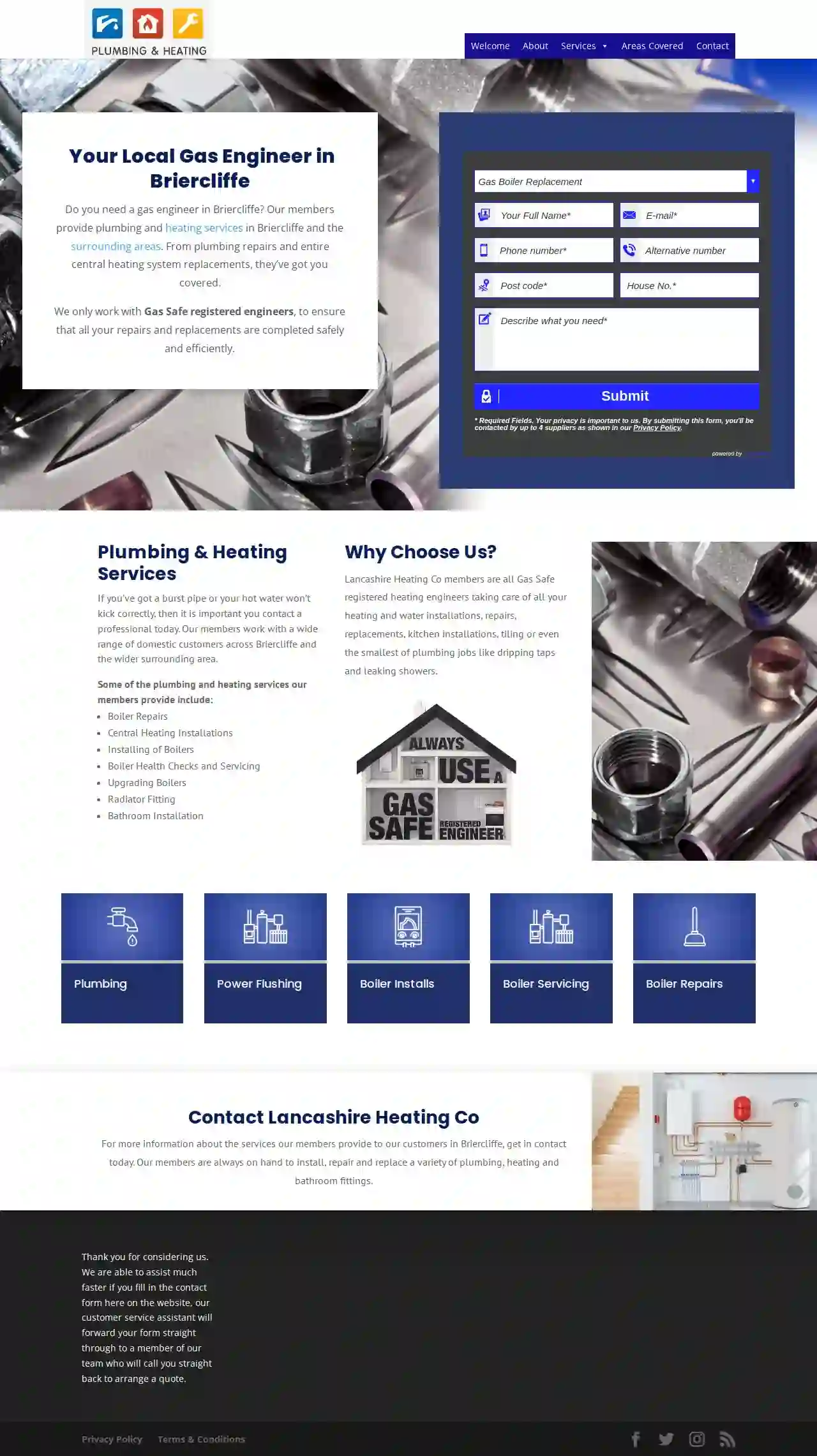
Daniel Burns Gas & Heating Services
53 reviewsLancashire, GBLancashire Heating Co provides plumbing and heating services in Lancashire and the surrounding areas. Our members are Gas Safe registered engineers, ensuring all repairs and replacements are completed safely and efficiently. We offer a range of services, including boiler repairs, central heating installations, boiler health checks and servicing, upgrading boilers, radiator fitting, and bathroom installation. Our team is dedicated to providing excellent customer service and ensuring that all our customers receive the highest level of workmanship and professionalism.
- Services
- Why Us?
- Gallery
Get Quote
Nigel Lazenby Heating & Plumbing
3.813 reviewsThe Business Centre, 1000 Chester Road, Unit 10, Birmingham, B37 6AA, GBLazenby Plumbing is a family-run business with over 25 years of experience in the plumbing industry. We pride ourselves on providing a reliable, efficient and friendly service to all our customers. We cover all aspects of plumbing, from small repairs to large installations. We are fully insured and Gas Safe registered, so you can be confident that you are in safe hands. Our team of experienced plumbers are dedicated to providing a high quality service at competitive prices. We are available 24 hours a day, 7 days a week for emergency call outs. We offer a wide range of plumbing services, including: Boiler installations and repairs Central heating systems Bathroom installations Kitchen installations Drainage services Leak detection and repair Water softener installations Contact us today for a free quote.
- Services
- Why Us?
Get Quote
Radical Heating Solutions Ltd
Unit 7, Chorley Central Business Park, Chorley, PR6 0BL, GBWith more than 35 years experience supporting installers, merchants, architects and developers both in the UK and internationally, Radical Heating Solutions Ltd are specialists in underfloor heating and heat pump systems, based in Chorley, Lancashire. We are so confident in our proposition that WE GUARANTEE TO BEAT ANY LIKE FOR LIKE QUOTATION for any underfloor heating system. We supply best in class products which are manufactured and designed to the highest technical standards and give technical support on the most relevant solution to fit every bespoke application
- Services
- Why Us?
- Gallery
Get Quote
Allcool (NW) Ltd
4.220 reviewsPoulton Le Fylde Business Park, Unit 6 Wyrefields, Poulton-le-Fylde, FY6 8JX, GBWe are the Leading Specialists in Air Conditioning, Refrigeration & Mechanical Services. Trusted by 1000s of businesses across the UK (and further). Well Established First set up in 1977, we’ve been your service provider for over 4 decades – going the extra mile to add value to make you glad you chose to work with us. Integrity We do all we can to earn your trust. We give good, honest advice, we work hard and we play fair in everything we do. Innovative Our industry is evolving all the time, and we stay abreast of new developments to keep you alert to the most efficient and most appropriate solutions for your needs. Learn about AllCool Did you know AllCool also supply Commercial-Grade White Goods for Business Excellence Tell us your requirements, and let’s tailor a solution that fits your business perfectly. Learn more 24/7 Emergency Service for Uninterrupted Comfort and Safety We understand that emergencies don’t wait for a convenient moment. That’s why we offer a 24/7 emergency service across all our heating, cooling, and refrigeration solutions. Find out more Our Commitment to Sustainability and Carbon Reduction First set up in 1977, we’ve been your service provider for over 4 decades – going the extra mile to add value to make you glad you chose to work with us. Find out more
- Services
- Why Us?
- Gallery
Get Quote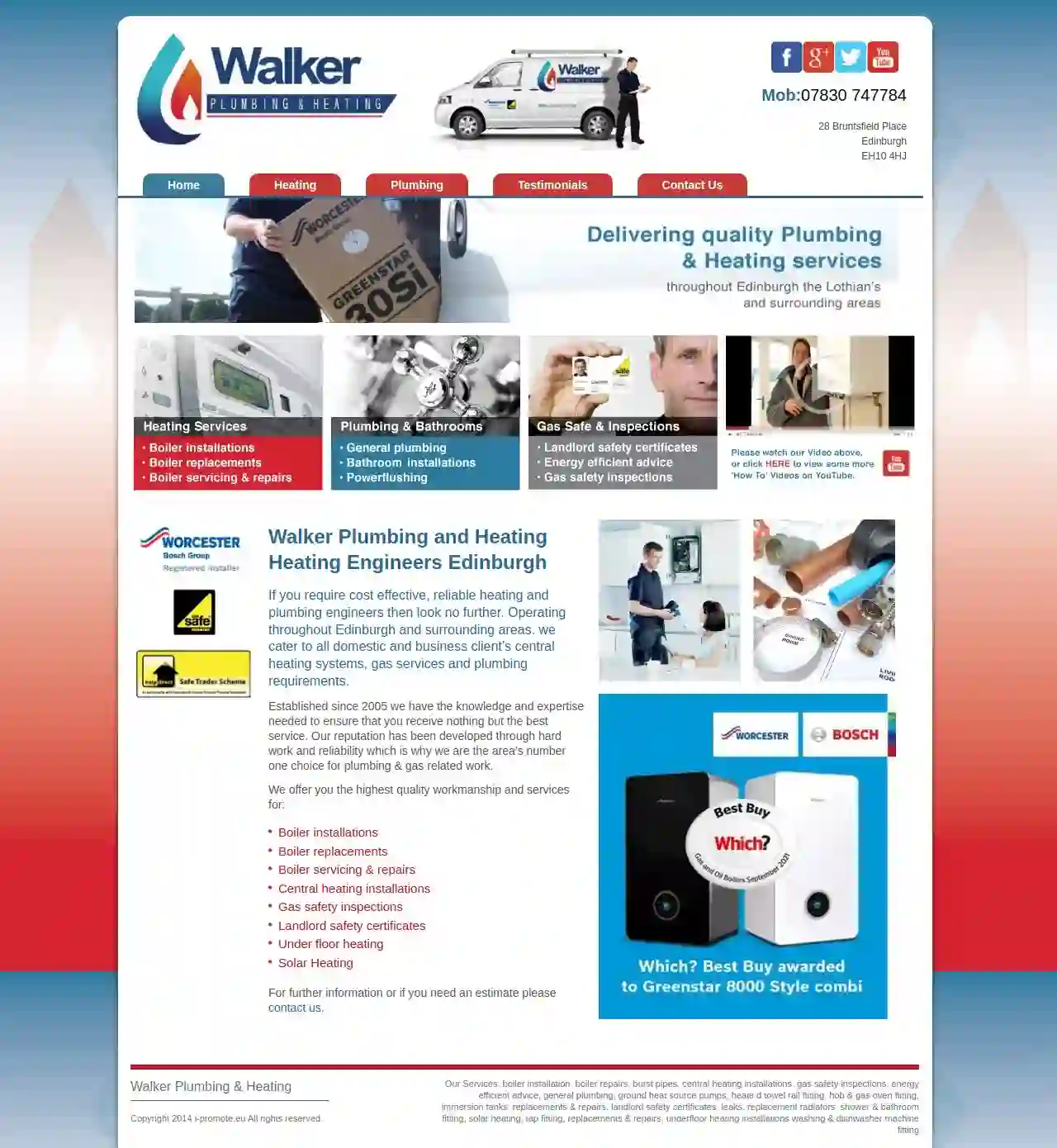
Walker Plumbing & Heating
Bruntsfield Place, Edinburgh, EH10 4HJ, GBWalker Plumbing and Heating is a reputable and experienced heating and plumbing company operating in Edinburgh and the Lothians. Established since 2005, we have built a strong reputation for providing cost-effective, reliable, and high-quality services. Our team of skilled engineers cater to all domestic and business clients, offering a range of services including boiler installations, boiler repairs, central heating installations, gas safety inspections, and more. We pride ourselves on our hard work, reliability, and commitment to providing the best service possible.
- Services
- Why Us?
- Gallery
Get Quote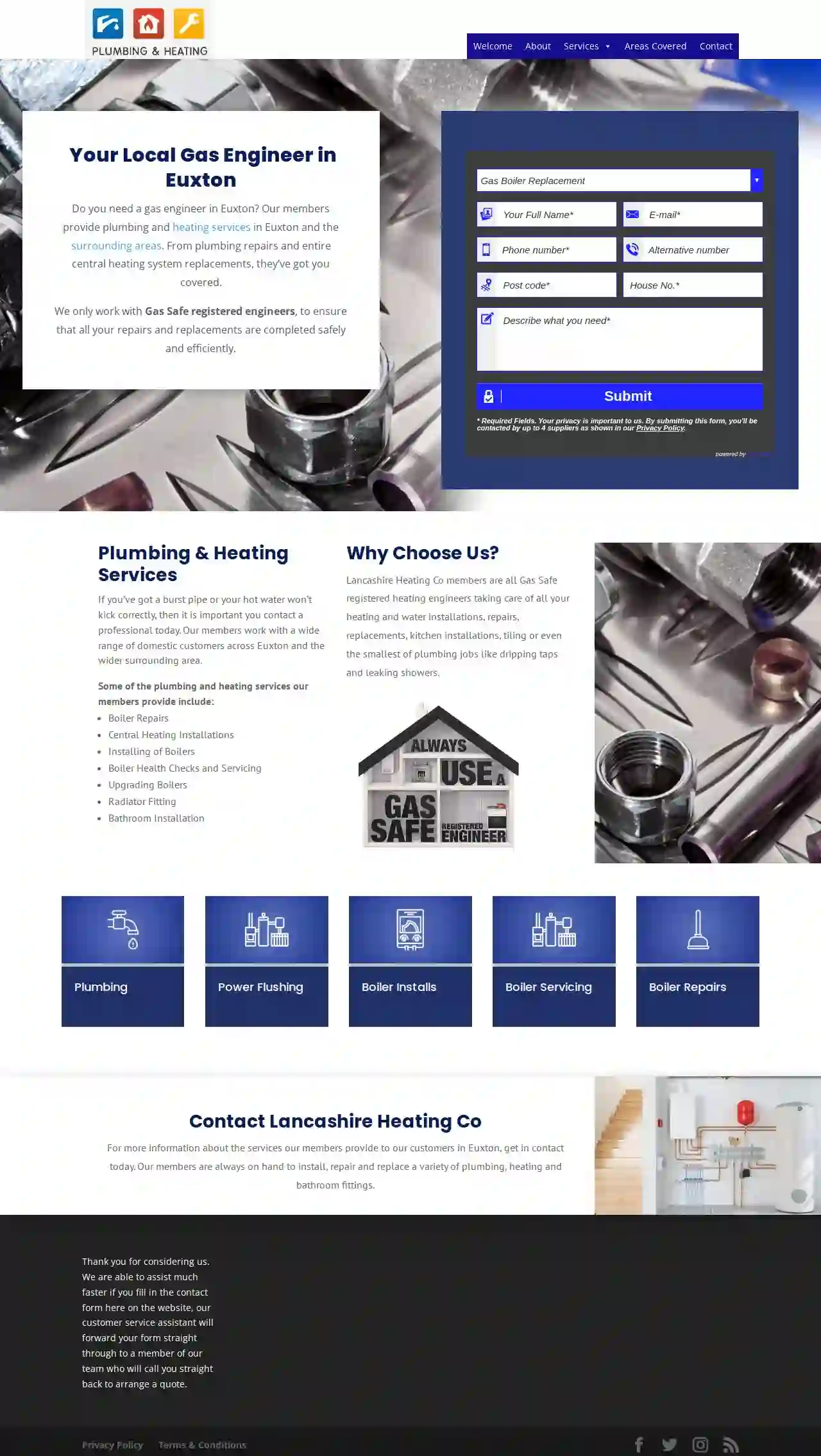
Michael O'Donnell Gas Services
51 reviewsChorley, GBLancashire Heating Co provides plumbing and heating services in Lancashire and the surrounding areas. Our members are Gas Safe registered engineers, ensuring all repairs and replacements are completed safely and efficiently. We offer a range of services, including boiler repairs, central heating installations, boiler health checks and servicing, upgrading boilers, radiator fitting, and bathroom installation. Our team is dedicated to providing excellent customer service and ensuring that all our customers receive the highest level of workmanship and professionalism.
- Services
- Why Us?
- Gallery
Get Quote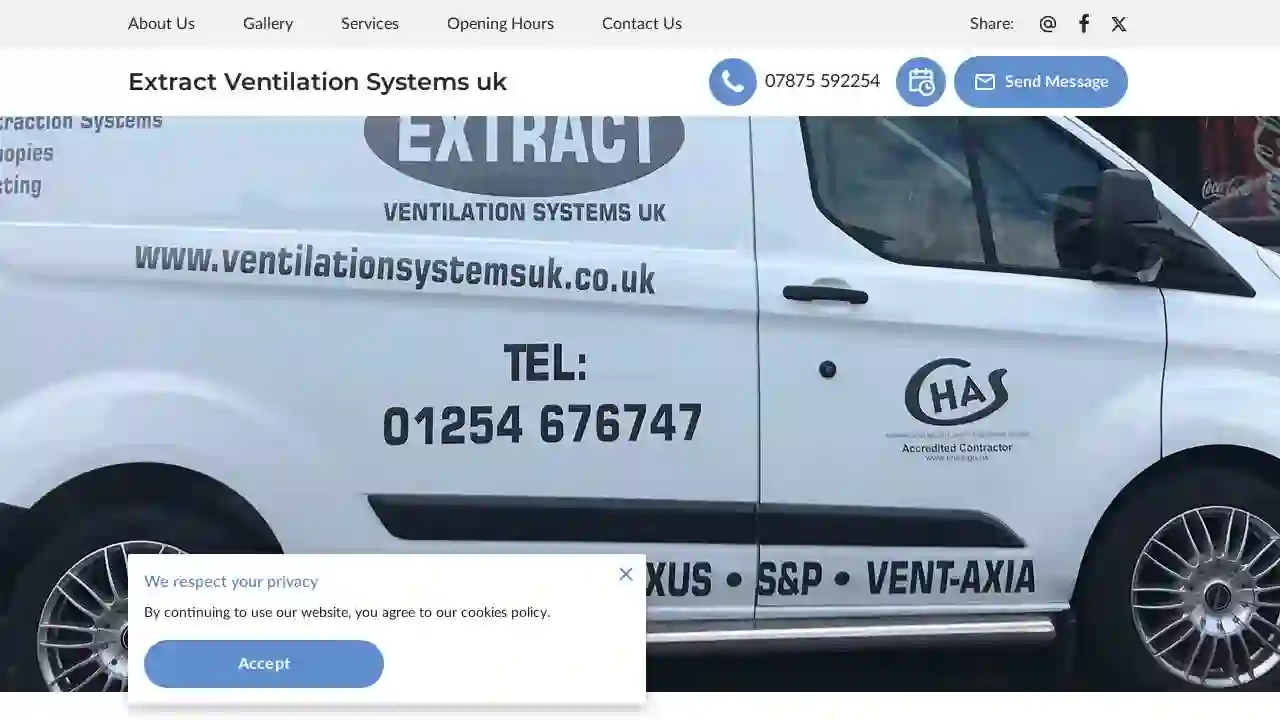
Extract Ventilation Systems
Chorley, GBBest Commercial Ventilation Services in Chorley. Our commercial ventilation engineers, based in Chorley, offer all aspects of commercial ventilation installation and servicing, with each solution tailored to your specific needs at competitive rates. Our services include the supply of new ventilation installations, servicing, upgrades and unobtrusive maintenance plans. At Extract Ventilation Systems, we have the knowledge and expertise to quickly identify your needs and provide a high level of professionalism. We’ll Blow You Away! As one of the most affordable installers of ventilation systems, you can count on our skilled workforce to deliver a top-quality service. Everything we do is completed to a professional standard: we arrive promptly, take pride in our quality results, and are always polite and friendly. We’ll even happily have a chat with you, providing, of course, there’s a cup of tea in it for us!
- Services
- Why Us?
Get Quote
Over 12,692+ HVAC Contractors onboarded
Our HVAC experts operate in Withnell & beyond!
HVACCompaniesHub has curated and vetted the Best HVAC Businesses arround Withnell. Find a trustworthy pro today.
Frequently Asked Questions About Boiler Installation
- Experience and Qualifications: Make sure the installer is Gas Safe registered (for gas boilers) or OFTEC registered (for oil boilers) in the UK, or similarly qualified and licensed in your region. Verify that the installer has a solid track record with positive reviews.
- References and Reviews: Ask for references and check online reviews to assess the installer's reputation.
- Detailed Quotes: Get written, itemized quotes from at least three contractors. Check for transparency and comprehensiveness in their estimates.
- Warranty: Inquire about warranties on both the boiler itself (from the manufacturer) and the installation (from the installer)..
- Insurance: Check that the installer has insurance coverage for any incidents during the installation.
- Payment Terms: Ask about their payment terms and any financing options they may offer.
What is a condensing boiler?
How do I turn off my boiler?
How do I find a boiler installer near me?
How do I choose a boiler installer?
What is a condensing boiler?
How do I turn off my boiler?
How do I find a boiler installer near me?
How do I choose a boiler installer?
- Experience and Qualifications: Check that the company is licensed, bonded, and insured. Verify that the installer has a solid track record with positive reviews.
- References and Reviews: Ask for references and check online reviews to assess the installer's reputation.
- Detailed Quotes: Get written, itemized quotes from at least three contractors. Check for transparency and comprehensiveness in their estimates.
- Warranty: Inquire about warranties on both the boiler itself (from the manufacturer) and the installation (from the installer)..
- Insurance: Check that the installer has insurance coverage for any incidents during the installation.
- Payment Terms: Ask about their payment terms and any financing options they may offer.